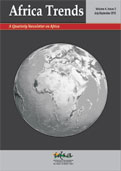The Resurgence of the Islamic State in the Sahel and Its Strategic Impact on Regional Security
While the Islamic State has been officially eliminated in Iraq and Syria, it is rapidly strengthening its bases in the territories outside Iraq and the Levant like the Sahel and West Africa through its local affiliates. It is also mending terms with the Al-Qaeda in Islamic Maghreb (AQIM) – now operating in the Sahel under the umbrella of the Group in Support of Islam and Muslims (GSIM). Its growing affinity with Al-Qaeda could strengthen and multiply its workforce and provide access to Al-Qaeda's existing resources.
- Yashasvi Chandra |
- July-December 2020 |





